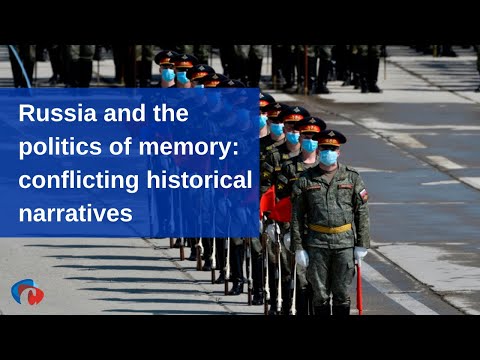We start at 14:30
On 24 June Russia is set to commemorate the 75th anniversary of the Soviet victory over Nazi Germany in highly unusual circumstances. The parade on Red Square in Moscow could not take place on its traditional date of 9 May because Covid-19 forced the city into lockdown. It is now being held on the same date it was held 75 years ago despite widespread public health concerns, which shows the importance the Kremlin attaches to this key event for domestic political purposes.
But it also has an important international dimension: while the legacy of the Great Patriotic War takes an important place in Russia’s collective memory, remembrance of the war and the communist past varies greatly across Eastern Europe. These conflicting historical narratives, sometimes known as ‘memory wars’, overlap with geopolitical divisions in Eastern Europe and exacerbate already existing tensions.
The Clingendael Institute is organising a webinar to discuss the impact of the ‘politics of memory’ on domestic and international politics across Russia and Eastern Europe. Clingendael moderator Bob Deen (Senior Research Fellow) will be joined by:
renowned historian Sergey Radchenko (Professor of International Relations at Cardiff University)
writer and former Russia correspondent Laura Starink (Raam op Rusland)
Key questions for discussion include:
How does Russia’s remembrance and glorification of the Soviet victory fit into the broader nation-building ideology of patriotism and conservatism as presented by President Putin? Which role does it play in domestic politics, especially in light of the all-Russian vote on the constitution from 25 June to 1 July?
What explains the vast differences in remembrance of Soviet history across the region and how does this trend of increasingly politicized or even ‘weaponized’ history influence international relations?
Are there any options to find common ground despite these bitter divisions over the past? How does Eastern Europe’s experience compare to western Europe, where recent events have also shown how difficult it is to cope with contested histories?
This webinar is the second installment of a series hosted by the new Clingendael Russia & Eastern Europe Centre (CREEC) and is organized together with knowledge platform Raam op Rusland. In a letter to Parliament, the Dutch Minister of Foreign Affairs recently noted that “knowledge in the Netherlands regarding Russia, the Russian people and Russian language has decreased in the past years”. By establishing the CREEC we bring our expertise together and aim to increase knowledge about Russia and Eastern Europe among Dutch government agencies, businesses and the broader public.
On 24 June Russia is set to commemorate the 75th anniversary of the Soviet victory over Nazi Germany in highly unusual circumstances. The parade on Red Square in Moscow could not take place on its traditional date of 9 May because Covid-19 forced the city into lockdown. It is now being held on the same date it was held 75 years ago despite widespread public health concerns, which shows the importance the Kremlin attaches to this key event for domestic political purposes.
But it also has an important international dimension: while the legacy of the Great Patriotic War takes an important place in Russia’s collective memory, remembrance of the war and the communist past varies greatly across Eastern Europe. These conflicting historical narratives, sometimes known as ‘memory wars’, overlap with geopolitical divisions in Eastern Europe and exacerbate already existing tensions.
The Clingendael Institute is organising a webinar to discuss the impact of the ‘politics of memory’ on domestic and international politics across Russia and Eastern Europe. Clingendael moderator Bob Deen (Senior Research Fellow) will be joined by:
renowned historian Sergey Radchenko (Professor of International Relations at Cardiff University)
writer and former Russia correspondent Laura Starink (Raam op Rusland)
Key questions for discussion include:
How does Russia’s remembrance and glorification of the Soviet victory fit into the broader nation-building ideology of patriotism and conservatism as presented by President Putin? Which role does it play in domestic politics, especially in light of the all-Russian vote on the constitution from 25 June to 1 July?
What explains the vast differences in remembrance of Soviet history across the region and how does this trend of increasingly politicized or even ‘weaponized’ history influence international relations?
Are there any options to find common ground despite these bitter divisions over the past? How does Eastern Europe’s experience compare to western Europe, where recent events have also shown how difficult it is to cope with contested histories?
This webinar is the second installment of a series hosted by the new Clingendael Russia & Eastern Europe Centre (CREEC) and is organized together with knowledge platform Raam op Rusland. In a letter to Parliament, the Dutch Minister of Foreign Affairs recently noted that “knowledge in the Netherlands regarding Russia, the Russian people and Russian language has decreased in the past years”. By establishing the CREEC we bring our expertise together and aim to increase knowledge about Russia and Eastern Europe among Dutch government agencies, businesses and the broader public.
- Kategorien
- Corona Virus aktuelle Videos
Kommentare deaktiviert.





![STEAM (SOFTWARE) ERROR [FIX]... steam needs to be online to update, please confirm your network.](https://i.ytimg.com/vi/b795YqqOh3A/mqdefault.jpg)






